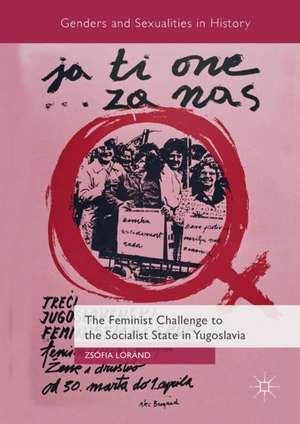The Feminist Challenge to the Socialist State in Yugoslavia: Genders and Sexualities in History
Autor Zsófia Lóránden Limba Engleză Hardback – 15 oct 2018
This book tells the story of new Yugoslav feminism in the 1970s and 1980s, reassessing the effects of state socialism on women’s emancipation through the lens of the feminist critique. This volume explores the history of the ideas defining a social movement, analysing the major debates and arguments this milieu engaged in from the perspective of the history of political thought, intellectual history and cultural history.
Twenty-five years after the end of the Cold War, societies in and scholars of East Central Europe still struggle to sort out the effects of state socialism on gender relations in the region. What could tell us more about the subject than the ideas set out by the only organised and explicitly feminist opposition in the region, who, as academics, artists, writers and activists, criticised the regime and demanded change?
| Toate formatele și edițiile | Preț | Express |
|---|---|---|
| Paperback (1) | 638.11 lei 6-8 săpt. | |
| Springer International Publishing – 8 feb 2019 | 638.11 lei 6-8 săpt. | |
| Hardback (1) | 643.48 lei 6-8 săpt. | |
| Springer International Publishing – 15 oct 2018 | 643.48 lei 6-8 săpt. |
Din seria Genders and Sexualities in History
-
 Preț: 282.38 lei
Preț: 282.38 lei - 18%
 Preț: 782.57 lei
Preț: 782.57 lei - 18%
 Preț: 629.18 lei
Preț: 629.18 lei - 20%
 Preț: 693.38 lei
Preț: 693.38 lei -
 Preț: 390.63 lei
Preț: 390.63 lei -
 Preț: 389.70 lei
Preț: 389.70 lei - 15%
 Preț: 698.94 lei
Preț: 698.94 lei - 15%
 Preț: 589.33 lei
Preț: 589.33 lei - 15%
 Preț: 641.71 lei
Preț: 641.71 lei -
 Preț: 389.11 lei
Preț: 389.11 lei - 15%
 Preț: 646.62 lei
Preț: 646.62 lei - 15%
 Preț: 645.47 lei
Preț: 645.47 lei -
 Preț: 389.70 lei
Preț: 389.70 lei -
 Preț: 385.84 lei
Preț: 385.84 lei - 18%
 Preț: 791.09 lei
Preț: 791.09 lei - 15%
 Preț: 701.90 lei
Preț: 701.90 lei -
 Preț: 391.61 lei
Preț: 391.61 lei - 15%
 Preț: 697.32 lei
Preț: 697.32 lei - 15%
 Preț: 643.34 lei
Preț: 643.34 lei -
 Preț: 388.72 lei
Preț: 388.72 lei -
 Preț: 238.73 lei
Preț: 238.73 lei -
 Preț: 390.63 lei
Preț: 390.63 lei - 15%
 Preț: 644.95 lei
Preț: 644.95 lei - 15%
 Preț: 698.15 lei
Preț: 698.15 lei -
 Preț: 391.61 lei
Preț: 391.61 lei -
 Preț: 418.07 lei
Preț: 418.07 lei - 15%
 Preț: 585.26 lei
Preț: 585.26 lei -
 Preț: 394.51 lei
Preț: 394.51 lei -
 Preț: 395.47 lei
Preț: 395.47 lei -
 Preț: 387.38 lei
Preț: 387.38 lei - 15%
 Preț: 646.62 lei
Preț: 646.62 lei - 18%
 Preț: 777.35 lei
Preț: 777.35 lei - 15%
 Preț: 697.15 lei
Preț: 697.15 lei -
 Preț: 416.16 lei
Preț: 416.16 lei - 15%
 Preț: 643.34 lei
Preț: 643.34 lei -
 Preț: 390.63 lei
Preț: 390.63 lei - 18%
 Preț: 786.66 lei
Preț: 786.66 lei
Preț: 643.48 lei
Preț vechi: 757.04 lei
-15% Nou
Puncte Express: 965
Preț estimativ în valută:
123.14€ • 128.40$ • 102.34£
123.14€ • 128.40$ • 102.34£
Carte tipărită la comandă
Livrare economică 21 martie-04 aprilie
Preluare comenzi: 021 569.72.76
Specificații
ISBN-13: 9783319782225
ISBN-10: 3319782223
Pagini: 270
Ilustrații: XXII, 270 p. 14 illus.
Dimensiuni: 148 x 210 mm
Greutate: 0.5 kg
Ediția:1st ed. 2018
Editura: Springer International Publishing
Colecția Palgrave Macmillan
Seria Genders and Sexualities in History
Locul publicării:Cham, Switzerland
ISBN-10: 3319782223
Pagini: 270
Ilustrații: XXII, 270 p. 14 illus.
Dimensiuni: 148 x 210 mm
Greutate: 0.5 kg
Ediția:1st ed. 2018
Editura: Springer International Publishing
Colecția Palgrave Macmillan
Seria Genders and Sexualities in History
Locul publicării:Cham, Switzerland
Cuprins
Chapter 1. Introduction.- Chapter 2. “Neither Class, Nor Nature” – (Re)Turning to Feminism in the Social Sciences and Humanities.- Chapter 3. Feminist Dissent in Literature and Art: Sisterhood, Motherhood and the Body.- Chapter 4. Feminism in the Popular Mass Media.- Chapter 5. Reorganising Theory: From Kitchen Tables to the Streets, from Theory to Activism.- Chapter 6. Conclusion.- Archival Sources.- List of Interviews.- Index.
Recenzii
“Lóránd presents a detailed history of the emergence and growth of feminism in Yugoslavia. … Lóránd’s study provides an important and welcome intervention. Her book reveals the unique expression of feminism in Yugoslavia, and in doing so helps to nuance the history of both life under state socialism and feminism itself. In many ways, the story of new Yugoslav feminism will be familiar to readers.” (Jane Freeland, German Historical Institute London Bulletin, Vol. 44 (1), May, 2022)
Notă biografică
Zsófia Lóránd is an intellectual historian of feminism in post-WWII state-socialist Eastern Europe. Since her time at the Central European University in Budapest, she has held positions at the European University Institute in Florence and the Lichtenberg-Kolleg in Göttingen.
Textul de pe ultima copertă
This book tells the story of new Yugoslav feminism in the 1970s and 1980s, reassessing the effects of state socialism on women’s emancipation through the lens of the feminist critique. This volume explores the history of the ideas defining a social movement, analysing the major debates and arguments this milieu engaged in from the perspective of the history of political thought, intellectual history and cultural history.
Twenty-five years after the end of the Cold War, societies in and scholars of East Central Europe still struggle to sort out the effects of state socialism on gender relations in the region. What could tell us more about the subject than the ideas set out by the only organised and explicitly feminist opposition in the region, who, as academics, artists, writers and activists, criticised the regime and demanded change?
Caracteristici
Provides a history of Yugoslav feminism in the 1970s and the 1980s Analyses feminist arguments in context, considering the different attitudes in the arts, humanities and social sciences Contributes to research on state socialism, women’s movements and on the neglected history of feminist political thought in Eastern Europe
